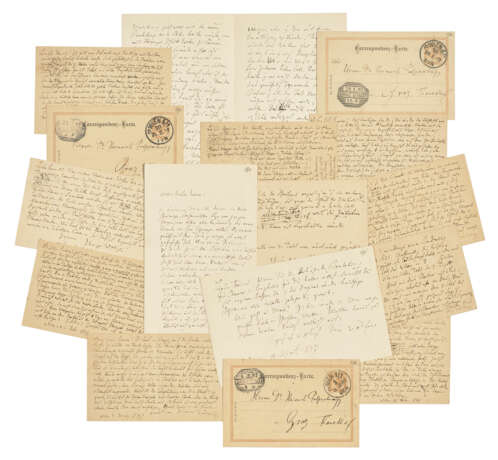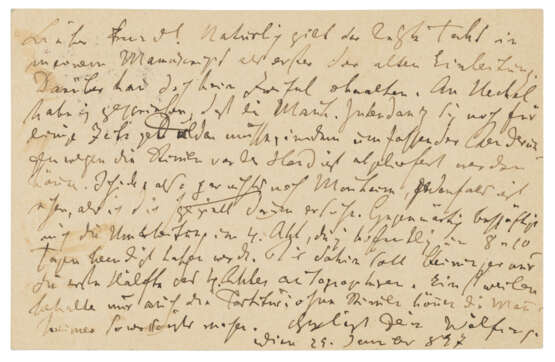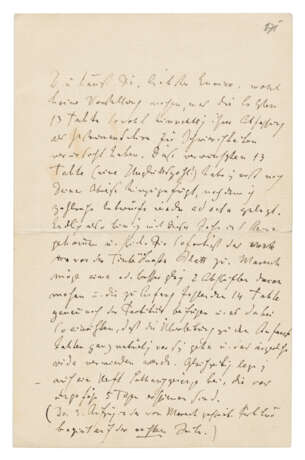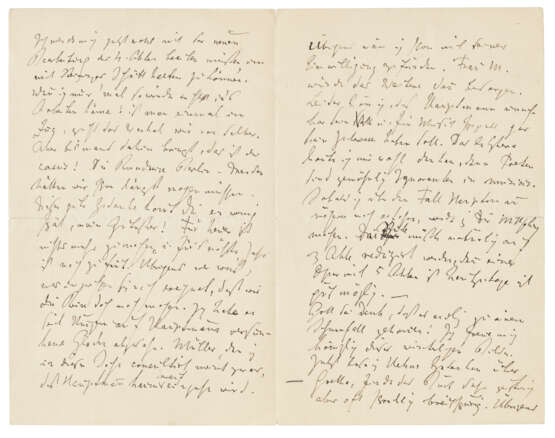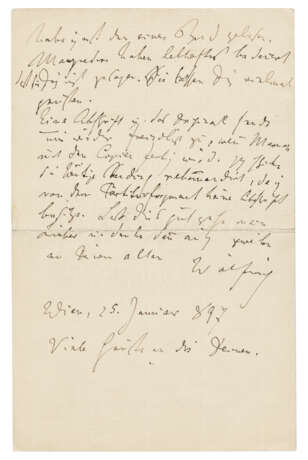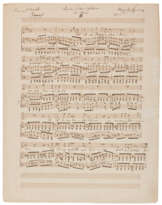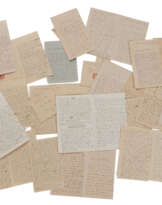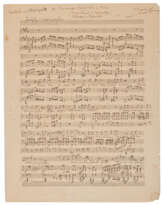ID 1349772
Lot 89 | Hugo Wolf (1860-1903)
Estimate value
£ 6 000 – 8 000
Three autograph letters signed and 13 postal cards signed (‘Wölfing’) to Heinrich Potpeschnigg, Vienna, 25 January – April 1897
In German. Densely written on 20 pages, letters 178 x 115mm, cards 90 x 142mm, postcards of 27 January, 19 February and 12 March with autograph musical quotations. Provenance: Ulrich Druener Musikantiquariat, July 2006.
Wolf in the frenzy of revisions for his opera Der Corregidor. The first letter laments his difficulties with a new passage, 'how the last thirteen bars, both in terms of their composition and instrumentation, have caused difficulties. These cursed thirteen bars (an unlucky number!) I only added after your departure ... I will now probably have to hurry with the new adaptation of the fourth act ... If only I could get back into the rhythm of working again! Once you're in the groove, the work takes care of itself. But getting there is the real challenge!'. A postcard two days later illustrates a small change for the violin part towards the end of the prelude to the third act. On 29 January Wolf is 'busy reworking the fourth act, which I hope to have finished in eight to ten days'. On 3 February he provides an explanation of his markings on a manuscript by Potpeschnigg's copyist Maresch (not present), 'The revision of the fourth act is giving me a lot of trouble', and invites Potpeschnigg to a recital of his songs at the Bösendorfer Saal. On 16 February he promises 'You will be delighted with the new music [for the fourth act]. I am currently working on the final part ... I will also change the instrumentation at the end of the first act. It should be more idyllic and not so pompous. Likewise, the trombones and tuba will be eliminated from the stormy embrace in the first act'. On 19 February Wolf writes of discovering 'an unmelodic passage in the second violin at the point where the first line in the fourth act begins', which he illustrates with two musical quotations; he again discusses his planned re-orchestration of the end of the first act. On 24 February he discusses changes to the prelude to act 3: 'The orchestral motif at the point "Dieser Glocken Morgengruss" is the counterpoint to the march theme of the first act. As you will soon find out, I have woven the accompaniment to the song "Und steht Ihr Früh am Morgen auf" into it, so counterpoint upon counterpoint. Write to me and tell me how you like it. The song recital was glorious, wild applause and a net profit of 140 fl., which is not to be sniffed at ...'. On 12 March he illustrates a change in the prelude to act 3 with two musical quotations, which he discusses again at length two days later, reporting also on a private recital, 'Yesterday evening at my place went wonderfully. My voice was splendid and my fingers were flying over the keys'. After 15 March the revisions to Der Corregidor were evidently complete: the correspondence resumes on 10 April on other matters, sending an unidentified song (perhaps one of the Michelangelo-Lieder). In the last letter on 5 May he writes with sympathy at the ill health of Potpeschnigg's mother, and with delight at the libretto for his proposed next opera, Manuel Venegas.
Heinrich Potpeschnigg (1847-1932), by profession a dentist in Graz but a talented amateur pianist and composer, was a dedicated supporter of Wolf's work, especially of Der Corregidor, working closely on the successful first performance at Mannheim in 1896 and on the 1897 revisions discussed in the present letters. This was almost Wolf's last period of productive work before tertiary syphilis set in: his only further compositions were three songs dating from December 1897. Published in Hugo Wolf. Briefe an Heinrich Potpeschnigg, ed. Heinz Nonweiller (Stuttgart 1923).
[Sold with:] Autograph letter signed by Wolf to [Marianne Brandt], Döbling, 1 February 1892, 2 pages; printed programme for the 'Lieder-Abend Hugo Wolf' at the Saal Bösendorfer, 3 April 1894 (worn); a partially printed tax receipt for Wolf, and a printed notice of Wolf's death, announced by the Hugo Wolf-Verein and the Richard Wagner-Verein.
| Place of origin: | Austria, Western Europe, Europe |
|---|---|
| Auction house category: | Letters, documents and manuscripts, Books and manuscripts |
| Place of origin: | Austria, Western Europe, Europe |
|---|---|
| Auction house category: | Letters, documents and manuscripts, Books and manuscripts |
| Address of auction |
CHRISTIE'S 8 King Street, St. James's SW1Y 6QT London United Kingdom | |
|---|---|---|
| Preview |
| |
| Phone | +44 (0)20 7839 9060 | |
| Buyer Premium | see on Website | |
| Conditions of purchase | Conditions of purchase |
